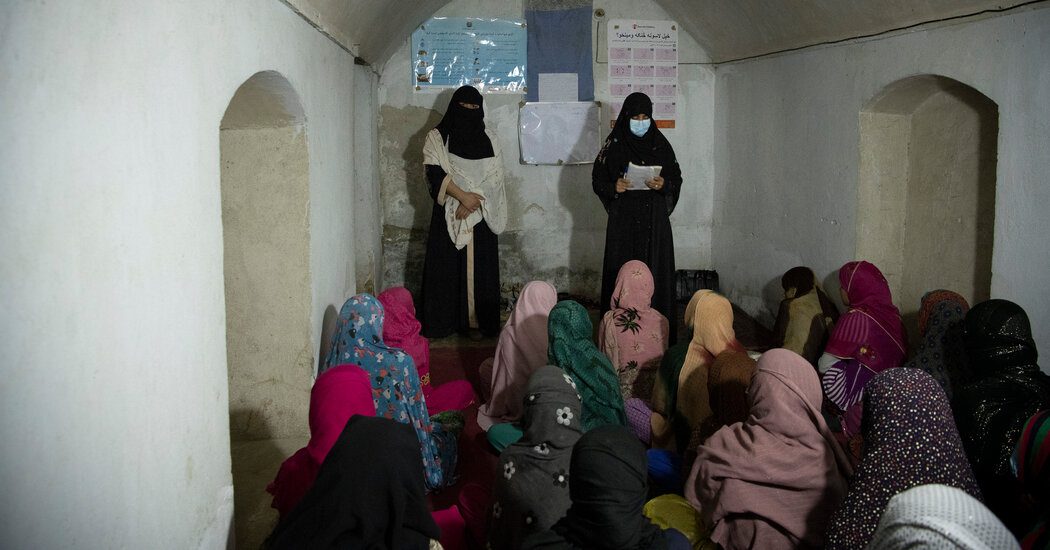Global Courant 2023-04-28 02:40:33
In a rare show of unity, the United Nations Security Council on Thursday passed a resolution condemning the Taliban’s discrimination against women and girls in Afghanistan and calling on the country’s leaders to reform policies that promote education, employment and equal public participation. of women and girls, to quickly reverse.
The resolution, co-sponsored by more than 90 countries, received 15 yes votes and passed unanimously in Russia’s final days in its month-long role as rotating Council presidency.
“The world will not stand by in silence as the women of Afghanistan are erased from society,” said Lana Nusseibeh, the UAE’s UN ambassador, who led the drafting of the resolution along with Japan’s representative. She said the council sent an “unambiguous message of condemnation” to the Taliban for their treatment of women and girls.
The resolution, which called for “full, equal, meaningful and safe participation of women and girls in Afghanistan,” also addressed the Taliban government’s April 4 edict banning the United Nations from employing Afghan women. That attitude — “unprecedented in the history of the United Nations,” the resolution said — “undermines human rights and humanitarian principles.”
The 15-member Security Council has been deeply divided since Russia invaded Ukraine and has been unable to reach a consensus on many of the world’s most pressing problems. While the council was finally able to agree on the Taliban’s treatment of women, negotiations over the final wording of the resolution were complex and lengthy, according to diplomats involved in the talks.
The resolution, which is legally binding under international law, does not specify what consequences the Taliban government in Afghanistan will face if they violate its demands. But in general, the Security Council can impose sanctions on countries or governments that fail to comply with its resolutions.
Continued discrimination against women and girls has been a major obstacle in the Taliban’s bid to gain recognition as the legitimate rulers of Afghanistan in the wake of the 2021 US withdrawal and the collapse of the Western-backed government.
Despite the Taliban’s ban on employing Afghan women, the United Nations has said it has no plans to leave the country yet because of the serious humanitarian needs of the Afghan people. Nearly two-thirds of Afghanistan’s 40 million people depend on humanitarian aid for food and medicine.
The UN mission in Afghanistan said in a statement in April that it cannot comply with the ban because it goes against international law and the principles of the UN charter. It has ordered its Afghan employees, both women and men, to stay at home, and launched a full review of its operations in Afghanistan on May 5.
The Taliban “are trying to force the United Nations to make a dire choice between staying and delivering in support of the Afghan people and sticking to the standards and principles we are obliged to uphold,” the statement said.
Since taking power in August 2021, the Taliban have been steadily restricting the rights of women and girls, reversing progress made more than two decades since a US-led military invasion in 2001 ended the first phase of the Taliban as rulers of Afghanistan.
Over the past year, Taliban leaders have denied girls access to education after sixth grade, denied women most jobs and limited their presence in public life.
UN Secretary-General António Guterres is convening a meeting next month in Doha, Qatar, to find a way forward in Afghanistan regarding humanitarian operations, Taliban governance and counter-terrorism.
The United Nations has said the Doha meeting is not about recognition of the Taliban, a matter for member states to decide for themselves.
Afghanistan’s seat at the United Nations is still held by the former government. The Taliban have appointed Suhail Shaheen, head of the group’s political office in Doha, but so far he has not been recognized by the UN Credentials Committee.
More than 100 civil society organizations and women’s rights activists came on Tuesday wrote an open letter to the United Nations urge her to take action against discrimination against the Taliban.
“It is time for the UN to stand up for women’s rights by standing with them and suspending its activities in Afghanistan until its female staff are allowed to work,” the letter said.
Christina Goldbaum contributed reporting.








